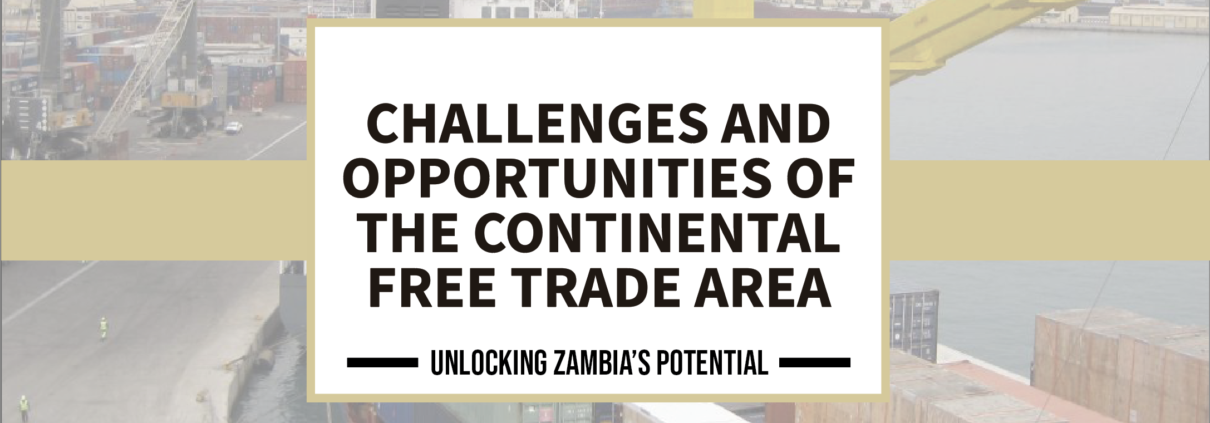Globally, countries are concluding Mega-Regional Trade Agreements (MRTAs), thus reshaping and changing the global trading landscape in the process. The establishment of the African Continental Free Trade Area (AfCFTA) will allow Africa to strengthen its position vis-à-vis the rest of the world. If the Continental Free Trade Area (CFTA) is successfully implemented, there are opportunities to address regional infrastructure challenges and link Zambia to international markets. Free movement of capital provides opportunities for both individuals and companies to benefit. It enables integrated, open, competitive and efficient African financial markets and services. For companies, there may be opportunities to benefit from higher investment returns from other African countries. Additionally, low tariffs allow consumers to have access to cheaper products and producers to better enter other African markets. Firms will have access to cheaper raw materials and intermediate goods from other African countries which will reduce their cost of production.
In order to benefit from the integration of markets, African economies must undergo a transition that involves the reallocation of economic resources to areas where their use is effective. This may result in short-run adjustment costs. After trade liberalization countries may experience falling trade revenue shrinkage of certain sectors and temporary unemployment as resources are shifted during this period. Moreover, insufficient financial and institutional capacity of countries may have adverse effects on labour force and small enterprises. Hence, the benefits of free trade area may not be shared equally. For many developing countries a lack of labor mobility between sectors is a key challenge. Support programmes, such as aid for trade and infrastructure investments, could be considered to help the most affected countries, in particular least-developed, landlocked and small economies.
Another challenge to be more likely faced by African countries could be the cost of transporting goods within the continent. African countries can solve this problem by becoming better connected through treaties, road networks as well as railway networks.
The Zambian Government is heading in the right direction as it has embarked on an ambitious programme of infrastructure development.
A free trade area must have Rules of Origin (RoO), that is, criteria for sorting out which products are actually produced within the region and should, therefore, be given FTA treatment such as not paying customs duties. Creation of AfCFTA is likely to encounter some challenges regarding negotiations on Rules of Origin. Much as the current African Regional Economic Communities (REC) have been in existence for some time, bottlenecks have been encountered regarding Rules of Origin. Some RECS are still reviewing Rules of Origin on some commodities. There are dissimilarities between the Common Market for Eastern and Southern Africa (COMESA), East African Community (EAC), Economic Community for West African States (ECOWAS) and Southern African Development Community (SADC) in Rules of Origin (RoO) – Africa’s case is not unique though as there is an absence of an agreed global set of rules (or parameters) guiding the design of rules of origin. The design of rules of origin depends on trade negotiations and often times influenced by certain political and economic factors.
Africa should refrain from adopting EU or US approaches to Rules of Origin (RoO). The simpler and less restrictive the better. It is feasible to have AfCFTA rules of origin if the negotiations take the approach of across-the-board thresholds or general rules for conferring origin. In COMESA for instance, any good can qualify for FTA treatment if the value of inputs from within the region accounts for 35 percent of total value of the good; or the value of inputs from outside the region does not exceed 60 percent of the total value of the good .
However, if the Rules of Origin negotiations take the approach of producing product-specific or list rules, that is, specifying a working and processing required for every single product for it to qualify for FTA treatment; it will definitely be impossible to have Rules of Origin for the AfCFTA in good time.
Zambia has become prone to global and regional risks which have the potential to negatively impact the country’s socio-economic development. The greater the level of integration or interdependence among countries, the greater the potential for a number of risks, such as political turmoil, migration, trade imbalances, illicit trade, infectious diseases and the effects of climate change. One of the potential challenges from free movement of people may include the increase of human trafficking and smuggling of illegal products. External shocks arising from financial integration and fluctuating commodity prices have been adversely affecting Zambia’s growth parameters. Other risks of concern include terrorism, cyber-crime, and digital misinformation. Arising from this, Zambia faces different effects brought about by regional and global integration. Going forward, the country has to harness the positives of global and regional integration as well as manage the potential risks.
Download the booklet here:




